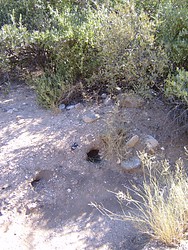

Taxidea taxus. Photograph courtesy of the U.S. Fish and Wildlife Service.
The picture is of a typical American Badger. You can see its long claws which it uses to make it's home and hunt with.
Introduction
In this page I am going to tell you where the badger can be found in the Sonoran Desert, by researching its habitat. First I'm going to tell you a little about the badger.
Main Content
What is a badger?
A badger is a rather small animal just short of a meter long (3 feet) and weigh from 4-10kg. It has small, thick legs with long claws that masure up to 3.75 cm. Their head is long and somewhat flat with quite big ears.
What does a badger eat and live off?
The badger is a carnivore and its diet is basically small animals, primarily herbivores, like rodents, squirrels, birds and their eggs. The badger usually digs for its pray insted of chasing it. This makes sense if you think about the badger's big claws.
Where can you find a badger?
The badger can basically be found all over the Western United States, in Southwestern Canada and in Northwestern Mexico. It is often found in the southern part of the Sonoran Desert. The badger lives everywhere, but mostly near river beds where there is soft soil they can dig in. The badger likes to dig holes where it lives. The holes are often 20-30 cm wide and often have a pile of dirt around the opening. Inside the holes there are several corridors.
Conclusion
So if you want to find a badger, go to a valley in the southern part of the Sonoran Desert. you need to spend a lot of time looking though - even though you might want to find a badger I doubt you will find one, since there tend to be no more than five badgers per square mile!


Badger holes look like this. This picture was taken in the Sonoran Desert, in a river bed with soft sand, where it's not too hard to dig. © 2005 hawk1
Information on the Internet
- The University of Texas, El Paso Museum You will find an internett page giving you general information on the Taxidea taxus or Ameriacan badger as some people call it.
- Lioncrusher's domain the website of Rebecca Postanowicz This also provides information about the badger, even though she is not profesional scientist, I belive the information is correct.



 Go to quick links
Go to quick search
Go to navigation for this section of the ToL site
Go to detailed links for the ToL site
Go to quick links
Go to quick search
Go to navigation for this section of the ToL site
Go to detailed links for the ToL site